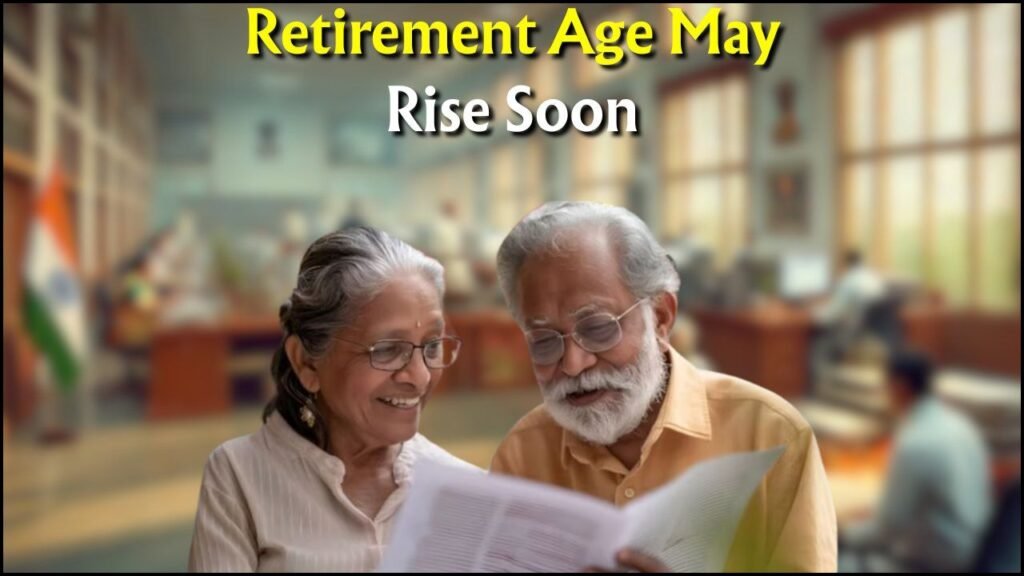
In what could be a significant policy shift, the Indian government is reportedly considering an increase in the retirement age for central and state government employees. The move, still under discussion, is part of a broader strategy to enhance institutional efficiency, tackle sectoral skill shortages, and manage the growing fiscal burden of pension payouts.
This potential decision has sparked conversations across ministries and public forums alike. For lakhs of employees nearing retirement, this could mean a longer tenure. For younger job aspirants, however, it raises concerns about shrinking opportunities. As the debate unfolds, let’s take a closer look at the key reasons, benefits, challenges, and what lies ahead.
Why Is the Government Considering a Retirement Age Hike?
The idea of increasing the retirement age isn’t sudden. It’s rooted in long-term demographic and economic realities:
- People are living longer and healthier lives, which means they’re able to work productively well into their 60s.
- Critical sectors like healthcare, education, and administration face manpower shortages that can hamper service delivery.
- Rising pension liabilities are putting pressure on state and central budgets. Delaying retirement can ease this burden.
- Global trends show a similar shift, with countries like Japan, the US, and Germany already implementing delayed retirement to address ageing workforce challenges.
Current Retirement Age Structure in India
Here’s a quick overview of the retirement age across various government departments and roles:
| Category | Current Retirement Age | Proposed/Discussed Age | Remarks |
|---|---|---|---|
| Central Government Employees | 60 years | 62–65 years | Some states have already increased to 62 |
| State Government Employees | 60 years | 62 years (varies) | Some states already increased to 62 |
| University Professors | 65 years | No change likely | Already at higher limit |
| High Court/Supreme Court Judges | 62–65 years | Possible alignment | May align with central policy |
| Armed Forces Personnel | Varies (52–60 years) | No major change | Based on rank and category |
| Medical Staff | 62–65 years | Consideration ongoing | Crucial due to health sector demand |
| Public Sector Employees | 60 years | May follow govt model | Depends on respective ministry guidelines |
| Scientists/Research Bodies | 62 years | 65 years | Already being implemented in some institutes |
What Could Be the New Retirement Age?
Although no formal order has been issued, several media reports indicate that the government is considering raising the retirement age for general employees to 62 or even 65 years. This change may not happen overnight. A phased rollout could start with departments that are facing acute workforce shortages.
Here’s what else could be in the pipeline:
- Performance-based extensions beyond the retirement age.
- Voluntary Retirement Schemes (VRS) to balance out promotions and hiring of younger candidates.
- Possible linking of service extensions to annual reviews and medical fitness.
Key Benefits of Increasing the Retirement Age
Extending the service tenure of experienced employees has multiple upsides for the government, the economy, and individuals:
| Advantage | Impact Area | Description |
|---|---|---|
| Economic Savings | Government expenditure | Delays pension outflow and reduces fiscal pressure |
| Skill Retention | Administration, R&D, Health | Experienced employees stay longer |
| Institutional Continuity | Public Services | Ensures smoother transitions and less disruption |
| Motivation for Late Careers | Human Resource Development | Encourages continued learning and productivity |
| Global Benchmarking | Policy Framework | Aligns India with global trends |
| Longer Professional Security | Employee Welfare | Helps families with continued income |
| Stabilized Recruitment Cycles | HR and Management | Allows time for better planning and recruitment |
| Productivity Enhancement | Operations | Reduces gaps from mass retirements in a single year |
This move particularly strengthens sectors that rely heavily on knowledge, experience, and institutional memory — such as health services, scientific research, and public administration.
Possible Challenges and Concerns
Despite the benefits, the proposal comes with its fair share of concerns — especially among youth, job seekers, and mid-level employees:
| Concern | Affected Groups | Explanation |
|---|---|---|
| Fewer Job Openings | Youth, Fresh Graduates | Delayed retirements may reduce vacancies |
| Promotion Stagnation | Mid-level Staff | Senior positions remain filled for longer |
| Efficiency Concerns | All Employees | Productivity may decline with age |
| Health-Related Limitations | Field/Physical Jobs | Older age may not suit certain active roles |
| Morale Issues | Mixed-age Teams | Could affect dynamics and motivation levels |
| Policy Backlash | Unions/Associations | Some unions demand hiring of youth over age extension |
| Legal Challenges | Judiciary, Administrative | Changes in service terms could attract legal scrutiny |
| Need for Evaluation Mechanism | HR & Governance | Strong monitoring needed for performance-based extensions |
For this change to succeed, it will be essential to put clear evaluation systems, health checks, and productivity measures in place.
State-Wise Retirement Age Trends
Some states have already moved forward with retirement age revisions. Here’s how different regions are approaching the issue:
| State | Retirement Age | Change Implemented | Remarks |
|---|---|---|---|
| Tamil Nadu | 60 years | Recently revised | Proposal to raise to 62 under discussion |
| Madhya Pradesh | 62 years | Implemented | Adopted earlier for state employees |
| Uttar Pradesh | 60 years | No change yet | Awaiting centre’s lead |
| Rajasthan | 60 years | No change | Under consideration |
| West Bengal | 60 years | Status quo | No public proposal yet |
| Andhra Pradesh | 62 years | Implemented | For government medical staff |
| Kerala | 60/62 years | Different by dept | Sector-specific retirement age |
| Delhi (UT) | 60 years | Central guideline | Will follow central decision |
What Government Employees Should Expect Next?
If and when the policy is formally announced, it will likely be rolled out in stages, possibly starting with sectors that are under severe staffing constraints.
Here’s what government employees should keep in mind:
- Stay updated with official notifications and circulars.
- Re-evaluate financial planning considering the possibility of extended service.
- Focus on performance – future extensions may depend on annual reviews.
- Engage with unions or associations to stay informed and advocate concerns.
- Be flexible and prepared for procedural and HR policy changes.
A Balancing Act of Opportunity and Challenge
The discussion around increasing the retirement age reflects a larger national challenge — balancing the wisdom of experience with the energy of youth. While the economic and administrative benefits are considerable, the potential downsides must be addressed through careful policy design, transparent communication, and inclusive workforce strategies.
As of now, no official notification has been issued by the Government of India. The information presented here is based on credible media sources and ongoing policy deliberations. Government employees and job seekers alike are advised to follow updates from authorized sources to stay informed.

Mangesh Garg is a passionate writer known for captivating stories that blend imagination and reality. Inspired by travel, history, and everyday moments, He crafts narratives that resonate deeply with readers



